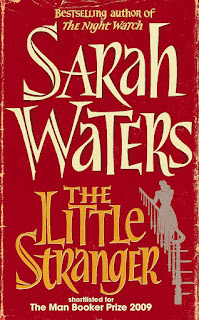The Little Stranger - Sarah Waters
Moving progressively towards more a more modern period, The Little Stranger's post-war period is significant, with traditional notions of class being upturned, most notably in the narrator Dr Faraday who, born the son of a housemaid at the estate of the Ayers family known as the Hundreds, succeeds in becoming a doctor and somewhat accidentally ends up being the personal physician for the Ayers family and witness to their decline.
That decline into madness is caused by a spirit that appears to torment the household, but it could just as easily be the sense of personal guilt, gossip, prejudice and betrayal that have driven previous Waters' characters to the madhouse. While there are no overt references to gay or lesbian characters in this book by the author, one suspects that the inversion of traditional roles in this new post-war society and the "unnatural" occurrences that ensue are something to do with the repression or confusion about one's nature - particularly in the figure of Caroline.
Whether you read The Little Stranger simply as an old-fashioned ghost story however - Waters writes flawlessly with absolute period authenticity - or want look for deeper meaning in the behaviour of the characters, there's certainly a psychological depth to this story that makes it comparable with Henry James' The Turn of the Screw, and Sarah Waters carries it off surprisingly well, if perhaps almost a little too well.




Comments
Post a Comment